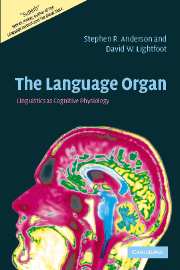Book contents
- Frontmatter
- Contents
- Preface
- 1 Studying the human language faculty
- 2 Language as a mental organ
- 3 Syntax
- 4 Sound patterns in language
- 5 Describing linguistic knowledge
- 6 Phonetics and the I-linguistics of speech
- 7 Morphology
- 8 Language change
- 9 “Growing” a language
- 10 The organic basis of language
- References
- Index
Preface
Published online by Cambridge University Press: 03 December 2009
- Frontmatter
- Contents
- Preface
- 1 Studying the human language faculty
- 2 Language as a mental organ
- 3 Syntax
- 4 Sound patterns in language
- 5 Describing linguistic knowledge
- 6 Phonetics and the I-linguistics of speech
- 7 Morphology
- 8 Language change
- 9 “Growing” a language
- 10 The organic basis of language
- References
- Index
Summary
One of the great success stories of post-Second-World-War intellectual inquiry has been the extent to which linguists have been able to make the syntactic and phonological structure of natural language into a serious object of explicit formal study. This work has uncovered principles of surprising subtlety, abstractness, and deductive richness; it has also raised fundamental questions concerning the ontogenetic and phylogenetic developments by which knowledge of this kind could develop in the organism. Much of this progress results fairly directly from the adoption of an explicitly biological perspective on the subject: instead of seeing language as an external phenomenon, as a collection of sounds, words, texts, etc. that exists apart from any particular individual, contemporary linguistics increasingly concerns itself with the internal organization and ontogeny of a special kind of knowledge. The specific form that this aspect of human cognition takes appears, we will argue, to be a species-specific property of human beings, and thus rooted in our biological nature.
As our subtitle promises, we will describe linguistics, the scientific study of (human natural) language, as cognitive physiology. An individual's use of language involves that person's brain: the way this brain works depends at least in part on childhood influences and whether the person was raised in New Haven, New Delhi, or New Guinea. The relevant aspect of the brain's structure that responds to these differences in experience is the person's language organ, but to characterize it we need to take seriously the notion of physiology as the study of functions.
- Type
- Chapter
- Information
- The Language OrganLinguistics as Cognitive Physiology, pp. ix - xxPublisher: Cambridge University PressPrint publication year: 2002



